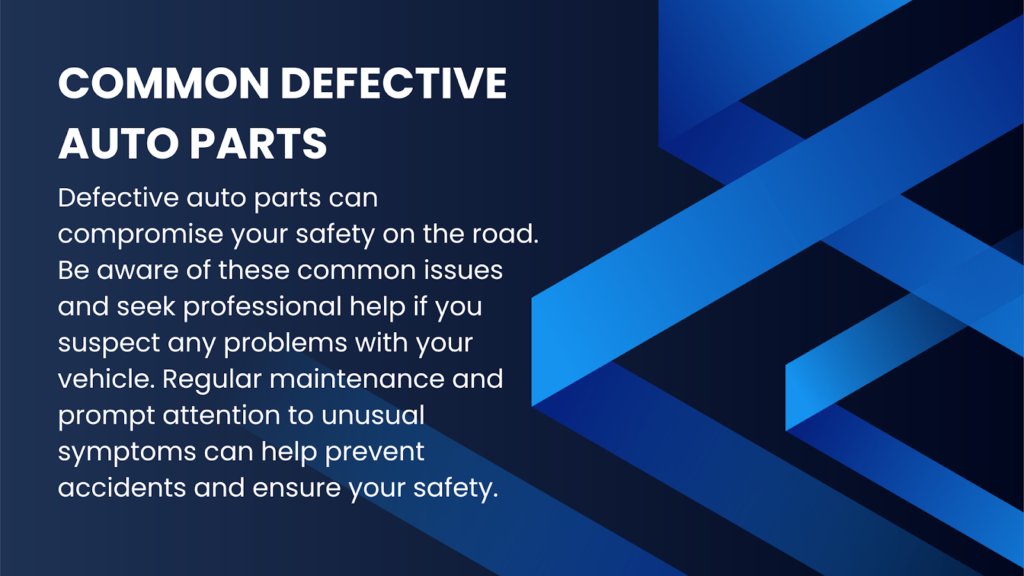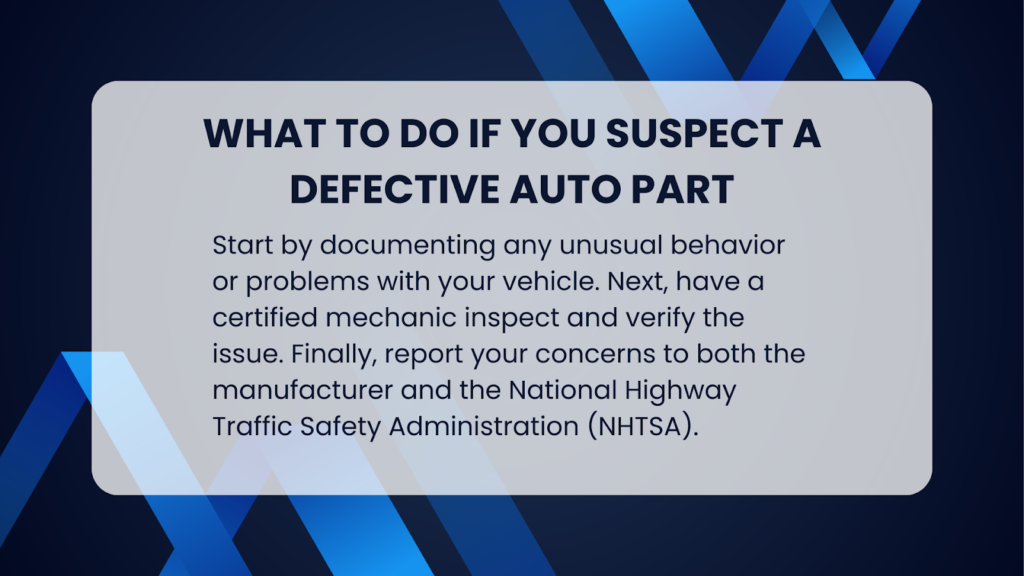
In 2022 alone, over 30 million vehicles were recalled in the United States due to defective parts. This staggering number highlights the prevalence and serious nature of automotive defects.
For Alabama residents, understanding the complexities of defective auto parts, manufacturer liability, and the recall process is crucial for ensuring road safety and protecting your legal rights.
Understanding Defective Auto Parts
Defective auto parts pose significant risks to drivers, passengers, and others on the road.
These faulty components can lead to accidents, injuries, and even fatalities.
Common types of defective auto parts include:
- Faulty brakes;
- Defective airbags;
- Malfunctioning steering systems;
- Flawed tires;
- Problematic fuel systems;
- Defective seat belts; and
- Faulty electrical systems.
Each of these defects can have severe consequences, ranging from minor inconveniences to life-threatening situations. Understanding the nature of these defects is the first step in addressing the issue and seeking appropriate legal recourse.

Manufacturer Liability in Alabama
When it comes to defective auto parts, manufacturers bear a significant responsibility.
In Alabama, as in other states, manufacturers are held to strict liability standards for defective products.
Key points about manufacturer liability in Alabama include:
- Strict Liability: Manufacturers can be held liable for defective products regardless of negligence.
- Design Defects: Liability for flaws in the product’s design that make it inherently unsafe.
- Manufacturing Defects: Responsibility for errors occurring during the production process.
- Failure to Warn: Liability for not providing adequate warnings about potential dangers.
- Breach of Warranty: Accountability for products that don’t meet expressed or implied warranties.
Alabama law provides various avenues for consumers to seek compensation for damages caused by defective auto parts. Understanding these legal frameworks is essential for anyone affected by such defects.
The Recall Process
Auto recalls are a critical mechanism for addressing defective parts and ensuring public safety. The recall process involves several steps and key players.
The typical recall process includes:
- Defect Identification: Through consumer complaints, accident reports, or internal testing.
- NHTSA Investigation: The National Highway Traffic Safety Administration may investigate potential defects.
- Recall Decision: Manufacturers or NHTSA decide to issue a recall.
- Notification: Manufacturers must notify vehicle owners, dealers, and distributors.
- Remedy: Offering free repair, replacement, or refund for the defective part.
- Monitoring: Ongoing oversight of recall completion rates and effectiveness.
For Alabama residents, staying informed about recalls affecting their vehicles is crucial. Regularly checking the NHTSA website or registering your vehicle for recall notifications can help you stay updated.
Legal Rights and Options for Alabama Consumers
If you’re an Alabama resident affected by defective auto parts, you have several legal rights and options available to you.
Your rights include:
- Right to Free Repair: For recalled parts, manufacturers must provide free repairs.
- Right to Reimbursement: If you paid for repairs before a recall, you may be eligible for reimbursement.
- Right to File a Lawsuit: You can pursue legal action for damages caused by defective parts.
- Lemon Law Protection: Alabama’s Lemon Law offers additional protections for new vehicle purchases.
Understanding these rights empowers you to take appropriate action and seek fair compensation for any damages or losses incurred due to defective auto parts.
Steps to Take if You Suspect a Defective Auto Part
If you believe your vehicle has a defective part, taking prompt and appropriate action is crucial.
Here’s a step-by-step guide:
- Document the Issue: Keep detailed records of any problems, including dates and descriptions.
- Report to NHTSA: File a complaint with the National Highway Traffic Safety Administration.
- Contact the Manufacturer: Report the issue directly to the vehicle or part manufacturer.
- Get a Professional Inspection: Have a certified mechanic examine and document the problem.
- Preserve Evidence: If possible, keep the defective part for potential legal proceedings.
- Seek Legal Advice: Consult with an experienced attorney specializing in auto defect cases.
Taking these steps not only protects your rights but also contributes to overall vehicle safety by bringing potential defects to light.

Navigating Insurance Claims for Defective Auto Parts
Dealing with insurance claims related to defective auto parts can be complex.
Here’s what Alabama residents should know:
- Coverage Varies: Not all insurance policies cover damages from defective parts.
- Documentation is Key: Thorough documentation of the defect and resulting damages is crucial.
- Manufacturer vs. Insurer: In some cases, you may need to deal with both the manufacturer and your insurer.
- Subrogation: Your insurer may pursue the manufacturer for reimbursement.
- Legal Assistance: Complex cases may require legal help to navigate insurance claims effectively.
Understanding your insurance policy and knowing how to navigate the claims process can significantly impact your ability to recover damages.
The Role of Alabama State Laws in Auto Defect Cases
Alabama has specific laws that come into play in auto defect cases. Understanding these laws is crucial for anyone dealing with defective auto parts in the state.
Key aspects of Alabama law include:
- Statute of Limitations: Generally, you have two years from the date of injury to file a lawsuit.
- Contributory Negligence: Your compensation may be reduced if you’re found partially at fault.
- Damages Caps: Alabama doesn’t cap compensatory damages, but there are limits on punitive damages.
- Product Liability: Alabama follows the “Alabama Extended Manufacturer’s Liability Doctrine” (AEMLD) for product liability cases.
These laws shape how defective auto part cases are handled in Alabama courts and can significantly impact the outcome of your case.
Preventing Issues with Auto Parts: Tips for Alabama Drivers
While manufacturers bear primary responsibility for defective parts, Alabama drivers can take steps to minimize risks and catch potential issues early.
Preventive measures include:
- Regular Maintenance: Follow your vehicle’s recommended maintenance schedule.
- Prompt Repairs: Address any unusual noises, vibrations, or performance issues promptly.
- Use Quality Parts: When replacing parts, opt for high-quality, manufacturer-approved components.
- Stay Informed: Regularly check for recalls and safety notices related to your vehicle.
- Professional Inspections: Have your vehicle inspected by a certified mechanic periodically.
By taking these proactive steps, you can help ensure your vehicle remains safe and catch potential defects before they lead to accidents or injuries.
The Future of Auto Safety and Manufacturer Accountability
As automotive technology advances, so do the challenges and opportunities in ensuring vehicle safety and manufacturer accountability.
Emerging trends include:
- Advanced Driver Assistance Systems (ADAS): Increasing complexity in vehicle systems may lead to new types of defects.
- Electric and Autonomous Vehicles: New technologies bring new safety considerations and potential defects.
- Enhanced Tracking Systems: Improved ability to track and analyze vehicle performance data.
- Stricter Regulations: Potential for more stringent safety standards and recall procedures.
- Consumer Awareness: Growing emphasis on educating consumers about vehicle safety and their rights.
Staying informed about these trends can help Alabama residents make informed decisions about vehicle purchases and maintenance, and understand the evolving landscape of auto safety and manufacturer liability.
Frequently Asked Questions
To address common concerns about defective auto parts, manufacturer liability, and recalls, here are answers to frequently asked questions.
How Do I Know If My Vehicle Has Been Recalled?
You can check the NHTSA website using your Vehicle Identification Number (VIN) or sign up for email notifications.
What Should I Do If I’ve Been in an Accident Caused by a Defective Auto Part?
Seek medical attention if needed, document the accident, report it to the police and your insurance company, and consider consulting with an attorney.
Can I Still File a Lawsuit If My Vehicle’s Defect Was Recalled?
Yes, you may still have grounds for a lawsuit, especially if you suffered damages before the recall was issued.
How Long Do I Have to Get My Vehicle Repaired After a Recall?
There’s no time limit for free recall repairs. However, it’s best to address the issue promptly for your safety.
What If the Dealership Says They Can’t Fix My Recalled Vehicle?
Contact the manufacturer directly. If the issue persists, file a complaint with NHTSA.
Don’t Wait – Your Safety and Rights Matter
Navigating the complexities of defective auto parts, manufacturer liability, and recalls can be challenging, but armed with the right information, Alabama residents can protect their rights and ensure their safety on the road.
Remember, if you’re dealing with a defective auto part, you’re not alone. Professional legal guidance can be invaluable in navigating these complex situations and ensuring you receive fair compensation for any damages or losses.
Contact us today for a free consultation. We’ll review your case, explain your options, and guide you through every step of the legal process.
Can't find what you're looking for? Search our site below.










